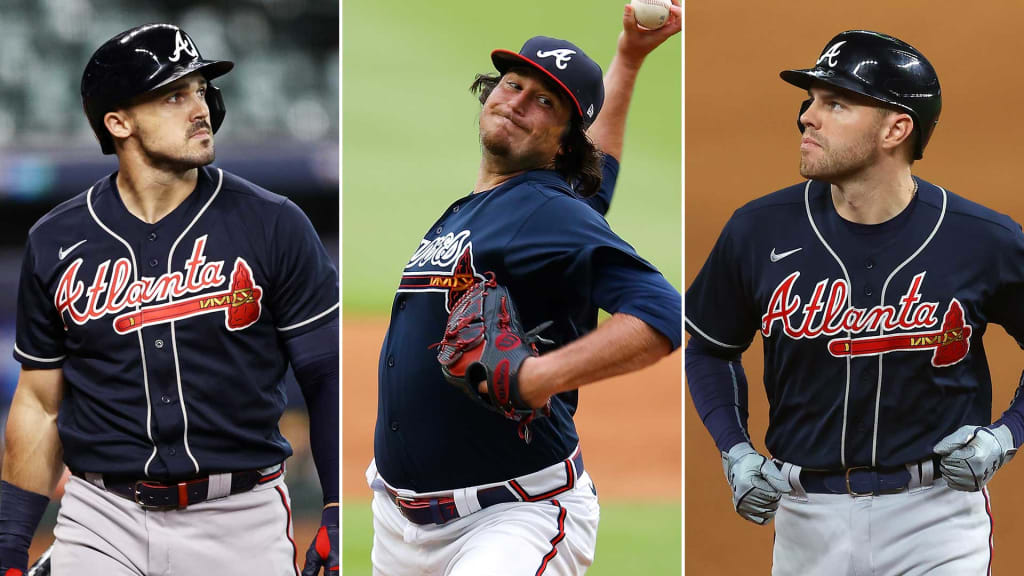
ATLANTA -- Mike Soroka is throwing again, and Charlie Morton is preparing to pitch for the Braves for the first time since Derek Lowe, Javier Vázquez and Kenshin Kawakami arrived in Atlanta before the 2009 season.
An encouraging thought about Soroka’s recovery followed by a reminder of Kawakami’s tenure in Atlanta seems to be just the right blend for 2020.
While many teams have remained quiet during the early portion of this offseason, the Braves have been active. Along with bolstering their rotation with the additions of Morton and Drew Smyly, they created some debate when they non-tendered outfielder Adam Duvall on Wednesday night.
Here are some of my thoughts about the non-tender decisions and the club’s other offseason needs:
Expensive gamble
Braves president of baseball operations Alex Anthopoulos deserves a lot of credit for opting to tender Adam Duvall a contract after the outfielder hit .132 with a meager .344 OPS over 57 plate appearances for Atlanta in 2018.
The cost of the gamble was $2.875 million, which proved to be money well spent when Duvall hit 10 homers with a .882 OPS over 130 plate appearances in 2019. He spent most of the season at the Triple-A level and then provided good value after Nick Markakis fractured his wrist in late July.
Anthopoulos’ decision to stick with Duvall was rewarded again this summer when the 32-year-old outfielder hit .237 with 16 homers and an .833 OPS during the 60-game season. That’s a 43-homer pace over 162 games.
But considering the cost to keep Duvall was going to likely be between $6.5 million-$7 million, the Braves opted not to take this kind of gamble on a cost significantly enhanced by a small sample size.
Duvall hit exactly half (eight of 16) of his homers within an eight-day span from Sept. 2-9. Included within this stretch was a pair of three-homer games. So, 37.5 percent of his home runs were hit over the course of two calendar days.
I get that if you take away Freddie Freeman’s top two games or his finest week of this past year, his MVP credentials would not have been quite as impressive. But you would still be looking at numbers that showed much more consistent production.
Duvall hit .229 with five homers and a .696 OPS through Sept. 1. He then hit .153 with a .572 OPS over the 22 games (including the postseason) that followed his second two-homer game on Sept. 9.
While Duvall is certainly not as bad as that final stretch would indicate, he also has not proven consistent enough to confidently gamble on the arbitration salary he would have received. The Braves could use that $7 million to land a legitimate middle-of-the-order power hitter, like they had over the past two years with Josh Donaldson and Marcell Ozuna.
Will Ozuna return?
Ozuna’s potential return to Atlanta still hinges on whether National League teams will once again use the designated hitter. While I’ve assumed the DH will remain universal, Anthopoulos and his peers don’t have the luxury to make assumptions.
So for now, the Braves’ search for that middle-of-the-order bat focuses on a left fielder or third baseman. Before going any further, it does not appear the Braves have any interest in trading for one year of the Cubs’ Kris Bryant. But they are open to moving Austin Riley to left field if necessary to make room for a power hitter.
Ozuna seemingly would provide the Braves exactly what they need. But until the DH issue is resolved, I wouldn’t hold my breath waiting for his return.
Why is Jackson back?
There was absolutely nothing to like about the 2020 version of Luke Jackson. The right-handed reliever’s four-seam velocity dropped from 96.1 mph to 94.4 mph, while the strikeout rate that drew attention in 2019 fell from 33.7 percent to 15.2 percent.
If you’re looking for a bright spot, Baseball Savant says his 6.84 ERA should have been more like a 4.71 ERA. Can I interest you in another Kawakami memory?
Anyhow, the Braves opted to keep Jackson around with a non-guaranteed $1.9 million deal. If he shows up in Spring Training and struggles, they can cut ties with him at a fraction of the cost. But if he can at least get back to where he was in 2019, he would be a decent fifth or sixth option out of the bullpen.
Will Smith, Chris Martin, A.J. Minter and Tyler Matzek currently serve as the primary base for next year’s bullpen. Josh Tomlin and Grant Dayton add depth to a relief corps that could be further enhanced by the presence of Jacob Webb, Huascar Ynoa, Patrick Weigel, Jasseel De La Cruz and some of the organization’s other talented young arms.
Freeman’s extension
Freddie Freeman’s potential extension has been a popular topic over the past few years, and it will draw more attention now that the first baseman is entering the final year of his contract.
My assumption has always been Freeman will remain with the Braves throughout his entire career, or at least throughout a majority of this decade. But there are no guarantees in this game. So, I’ve wondered about the possibility of him returning home to play for the Angels.
Playing for the Angels would put him 30 minutes from his California home and close to both his father and other family members. It would also reunite him with former Braves assistant general manager Perry Minasian, who recently became the Angels' GM.
But the Minasian angle shouldn’t be considered significant. Freeman and Anthopoulos have formed a strong bond while maintaining frequent communication over the past few years.
At some point within the next few months, when both sides have a better understanding of the future financial landscape, they will have a chance to truly begin negotiating. Until then, I’ll keep assuming Freeman will remain with the Braves long beyond 2021.
